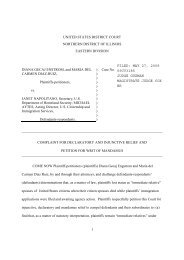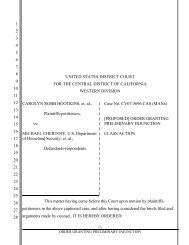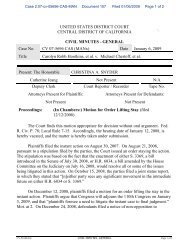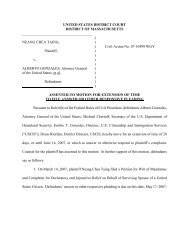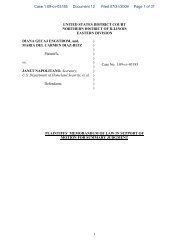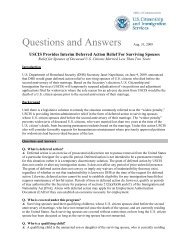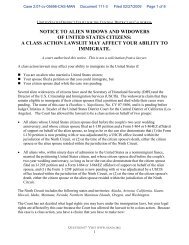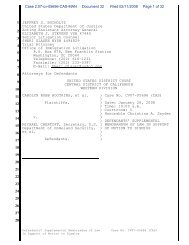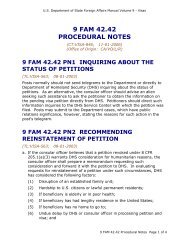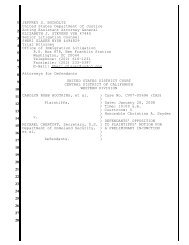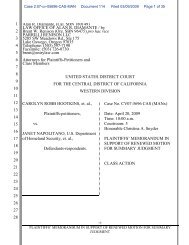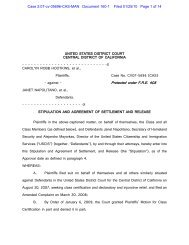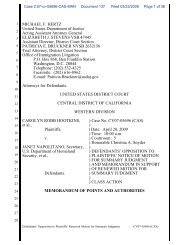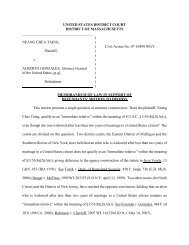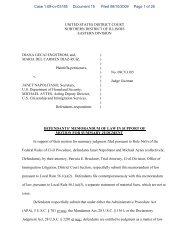Robledo Response to Motion to Dismiss - Surviving Spouses ...
Robledo Response to Motion to Dismiss - Surviving Spouses ...
Robledo Response to Motion to Dismiss - Surviving Spouses ...
You also want an ePaper? Increase the reach of your titles
YUMPU automatically turns print PDFs into web optimized ePapers that Google loves.
Petitioners fall within the definition of “immediate relative” provided by the first<br />
sentence of § 1151(b)(2)(A)(i) because each citizen-spouse filed an I-130 petition <strong>to</strong> classify his<br />
wife and, in the case of the minor Plaintiff Pinzon, his step-son, as “immediate relatives” under<br />
the statute. In light of the fact that Plaintiffs’ respective citizen spouses filed I-130 petitions, the<br />
deaths of their citizen spouses are of no moment <strong>to</strong> Plaintiffs’ classification status. Nothing in<br />
the statute authorizes the au<strong>to</strong>matic stripping of their eligibility for “immediate relative”<br />
classification due <strong>to</strong> their husbands’ deaths during bureaucratic processing. 8 U.S.C. §<br />
1154(a)(1)(A)(i); 8 C.F.R. § 103.2(b)(12) (2008) (eligibility at time of filing).<br />
Defendants argue that because § 1154(b) is worded in the present tense, the facts attested<br />
<strong>to</strong> in the citizen’s petition must be true at the time of the adjudication of the petition and that the<br />
alien must be an immediate relative at the time of that determination. MTD at 29. Defendants<br />
point <strong>to</strong> the usage of the phrases “are true” and “is an immediate relative”, as supporting its view<br />
that it is no longer true that a surviving spouse remains a spouse for immediate relative purposes.<br />
The Court in Robinson addressed the argument this way:<br />
[Respondents] cite two district court cases from other jurisdictions, Burger v.<br />
McElroy, 97 Civ. 8775 (RPP), 1999 U.S. Dist. LEXIS 4854 (S.D.N.Y. Apr.<br />
12, 1999) and Turek v. Dep’t of Homeland Security, 450 F. Supp. 2d 736<br />
(E.D. Mich. 2006). In Burger the Government argued, as they do here, that<br />
they could not approve an I-130 petition because 8 U.S.C. § 1554(b) provides<br />
that a petition shall be approved only if the At<strong>to</strong>rney General “determines that<br />
the facts stated in the petition are true.” Because the statute is phrased in the<br />
present tense, the court in Burger determined that the government permissibly<br />
construed the statute when it determined that, because the citizen spouse had<br />
died while the application was pending, it was no longer true that the<br />
surviving widow was a spouse. Therefore, the court determined that the<br />
Government’s interpretation of the statute was entitled <strong>to</strong> deference under<br />
Chevron. Burger, 1999 U.S. Dist. LEXIS 4854, at * 17 (citing Chevron, 467<br />
- 24 -



